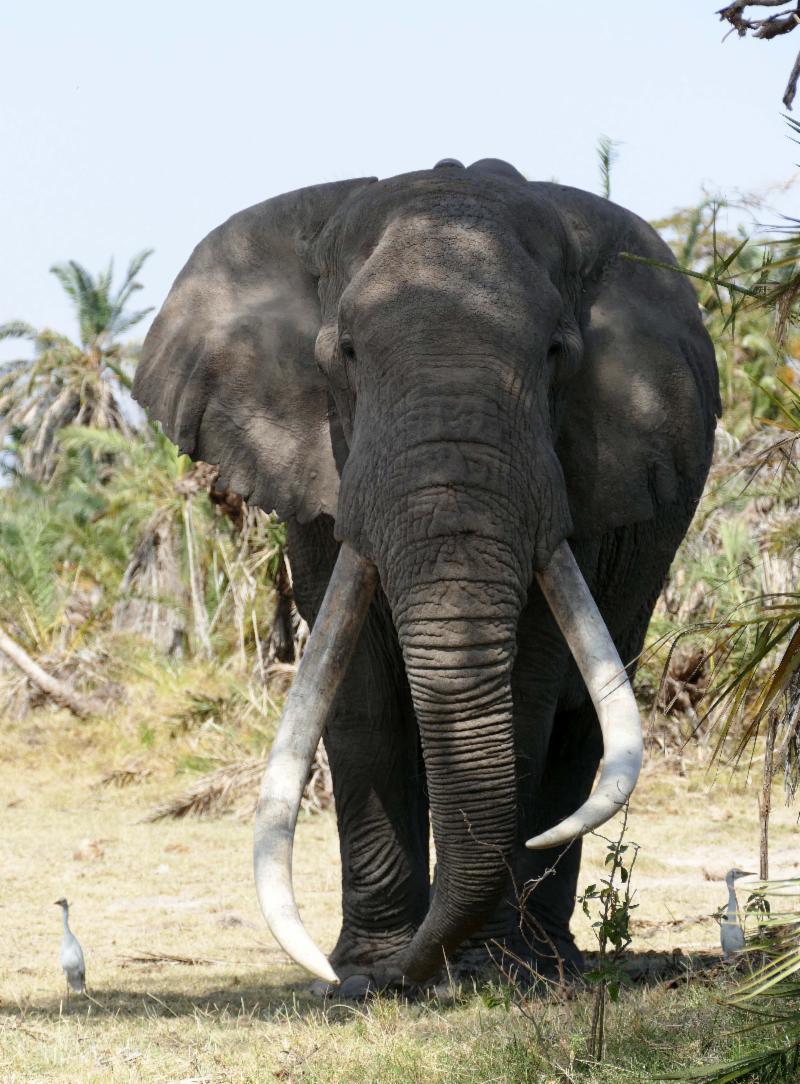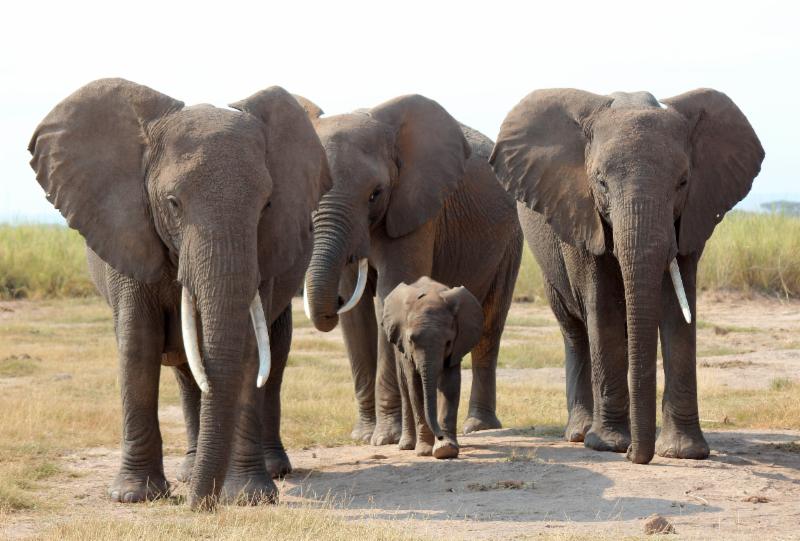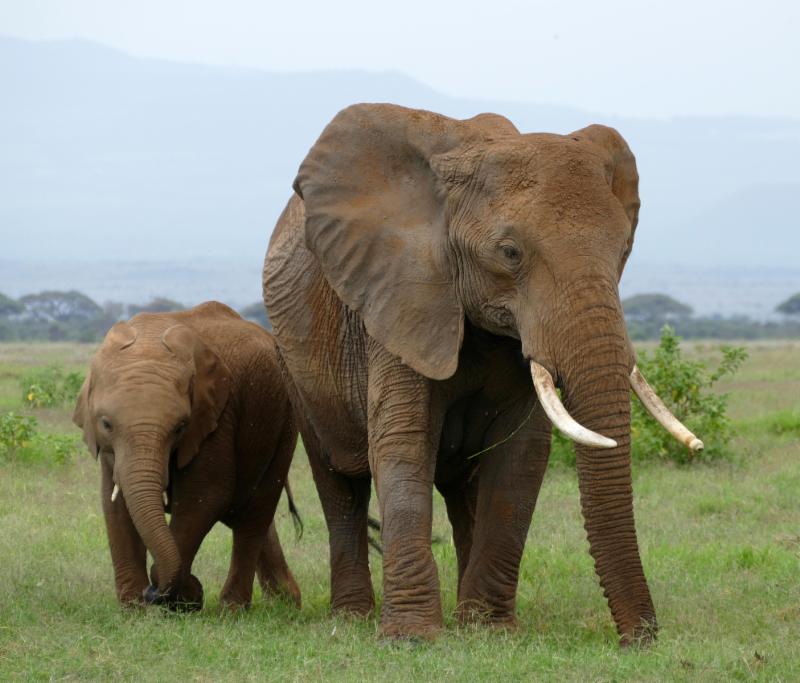
One of Amboseli's most magnificent bulls, Tim, needs your help to assure his future
|
Total Aerial Count: Amboseli & West Kilimanjaro
|
|
|
|
Norah with KWS pilot Chris Cheruiyot during the two-day training
|
As we go to press, Norah is participating in a total count of the ecosystem. Total counts do just what they say - count
everything; people, livestock, wildlife and settlements, to get an up to date picture of the ecosystem. This year will be especially challenging thanks to all the tall grass.
These are complex operations to organise, and KWS has had assistance from many partners to provide enough planes, pilots, spotters, data handlers... Training takes two days, to make sure everyone can handle the communication needed for spotters and pilots to accurately record data. We look forward to seeing the results!
|
|
This month our newest recruit, Moses Saruni graduated from the Kenya Wildlife Service Training Institute having completed his course in community wildlife management. We are very proud of Moses' achievements and we think his contribution to the ecosystem will be invaluable in years to come
.
|
|
On the 14th of June, Katito and Sylvi attended an art exhibition in Nairobi's Matbronze gallery, organised by Mia Kora to raise money for elephants, and awareness for ATE and our work. The exhibition, featuring some of Kenya's well known artists, attracted a large and engaged crowd of art lovers and elephant enthusiasts. Mia Kora are manufacturers of wearable art: gorgeous art prints applied to beautifully made scarves manufactured locally. They used the event to raise money for a number of elephant charities and donated all their proceeds to ATE.
We are hugely grateful to Mia Kora, and everyone who supported us during the exhibition week. It was such a beautiful celebration of elephants. Mia Kora's efforts have also secured us a much-needed overhaul of our camp water bowser; not the most glamorous part of our work to support but so crucial for keeping us working. Thanks to Priya Shah and Charanjeet (Chaz) Singh for their understanding that the small things make a huge difference to us!
|
|
|
Katito and Sylvi looking superb at the opening night in front of a life-size elephant print by Gurveer Sira.
|
|
|
Ways to Support Us
Follow an Amboseli Family with Elatia

We have chosen six Amboseli families for our Elatia program: the AAs, EBs, FBs, GBs, OAs, and PCs, You can chose one or all of the families to follow. Regular updates include photos and videos, and news of what is going on in the family.
To learn more about Elatia
go to
This Link.
If you have any problems, Tal has made a tutorial for signing up,
Click Here.
You can also contact her directly if you have any questions on:
**********
Name a Baby Elephant

This calf was recently named Marilyn by one of our donors. Her beautiful mother Maureen is in the MB family. You too can name a baby elephant.
Unlike our Elatia program where many people follow the same family, our naming program is a unique experience. The calf becomes "your" calf and yours alone and the name you give forms a part of the Amboseli dataset for all time. For more information write to us at:
[email protected]
*********
iGive
One of the ways you can support ATE is by making your online purchases through iGive. If you sign up the Amboseli Trust for Elephants as your recipient organization we will get a small percentage of the sale. Connect with
iGive
.
*********
Give a Gift that Lasts Forever
Designate the Amboseli Trust for Elephants as a beneficiary of your will, individual retirement account, or life insurance policy. To learn more about planned giving opportunities, please contact Betsy Swart:
Tel +1-508-783-8308.
|
|
|
News from the Amboseli Trust for Elephants
April - June 2018
|
It's hard to believe that I'm writing an introductory letter for the 50th newsletter. I launched the first ATE newsletter in August 2010. So much has happened in the subsequent eight years, but at the same time it seems like only a short while ago.
In that August newsletter I mostly wrote about the end of the horrific 2009 drought. It was such a difficult time. We had lost more than 400 elephants as a result of the drought and an upsurge in poaching. The population went from about 1,490 to 1,150. Sixty percent of the calves born in 2008 and 2009 died. More than 100 females died; 28 were matriarch losses - the most devastating event that can happen to an elephant family.
Would the population ever recover? Well elephants turned out to be more resilient than we knew. Environmental conditions changed for the better and we had a fantastic baby boom. Poaching was nearly eliminated thanks to our ecosystem partners, the Big Life Foundation working with the Kenya Wildlife Service. Younger females took over as matriarchs and they have done a splendid job. I have so much respect for these elephant leaders.
Now eight years later the population is up to 1,680, but there are new threats to the elephants' future. We are particularly concerned about land-use changes with resulting negative human-elephant interactions. Keeping the Amboseli ecosystem open to elephants is a huge challenge but one we are tackling and one we won't give up on.
Cynthia Moss
Director
Amboseli Trust for Elephants
|
|
 |
|
|
 |
|
Paru and her twins
|
 |
It has been a long wait. Thirty-seven years and nine months to be precise, but we have finally recorded our second set of twins in the study.
Out in the field during the Easter weekend, Cynthia was stopped by a KWS vehicle, whose team asked her if elephants ever had twins. They had seen two small, same-sized calves following a single female on the way into the swamp. Cynthia explained how rare it is (about 1% of births, but more rare in Amboseli), and promised we would keep an eye out. Often similar-aged calves follow the same female, particularly if she is mother to one and grandmother to the other, so spotting twins for sure means being 100% certain both calves belong to the same mother. Since grandmothers sometimes double-suckle with their daughters (i.e. both females permit both calves to suckle), even a suckling bout isn't enough to determine maternity 100%. We kept looking for the possible twins after this first report but we didn't know who we were looking for and many families were returning to the Park after the rains.
After almost a month, Norah and Katito found Paru from the PA family with two same-aged calves alongside her. Spending more than two hours with them in order to be sure, they confirmed these were indeed twins. As with our first (famous) twins, Equinox and Eclipse, these new twins are non-identical, with one male and one female calf. Also as Cynthia observed for Equinox and Eclipse, the male calf was trying to prevent the female from suckling. Despite this both calves looked healthy and we are confident Paru has a great chance to raise them successfully, since it has been such a good year and she is a big and experienced female.
 |
|
 |
At sunset, five-year-old Padua guards the twins, almost invisible in the tall grass |
Paru's older calf Padua is a very attentive big sister and the twins are fat, playful and healthy. Over time the competition for suckling is also resolving, which happened for the previous twins as well. We are delighted with these special additions to our study population, and we look forward to watching them grow up wild and free in Amboseli.
|
Culture and Conservation
In April ATE's Resident Scientist Dr. Vicki Fishlock was invited to a workshop in Parma, Italy, hosted by the Fondazione Monteparma for the Convention for Migratory Species working group. CMS is an international agreement that protects important populations of songbirds, whales, gorillas and other species that span international boundaries, whose conservation needs require international action and agreements to protect their future.
In 2014 a whale conservation workshop highlighted the importance of culture--behavioural traits learned within populations that help those populations thrive, drive speciation and are not genetically inherited. These traits are a crucial part of biodiversity that need to be recognised in conservation planning and the impacts humans have on other species.
CMS has since recognised that this is true for many species besides whales, and has broadened its remit to bring together world experts to exchange ideas and find new ways to build sustainable conservation.
|
|
Vicki presents during the public session at the newly refurbished Fondazione Monteparma auditorium.
|
Vicki was invited because of her experience working with forest elephants in Republic of Congo, and through her work on elephant social strategies at the human-elephant interface in Amboseli. She got to meet one of her biology heroes, Prof. Hal Whitehead, at the conference, and was inspired by discussions with colleagues working on killer whales, sperm whales, wolves and birds. Afterwards she said "this was one of the most exciting meetings I've ever been to, where we shared ideas and put them together to build something that could really guide conservation practice and real-world policies". Vicki has been invited to become a member of the working group and will continue representing elephants in this arena. Amboseli's strong conservation partnerships therefore get a new avenue to influence international policy.
|
|
ATE's Scholarship Program
Since 2002 ATE has supported talented young people from the Amboseli Ecosystem with scholarships because we believe that educational empowerment is key for sustainable human-elephant co-existence. Amboseli has recently seen dramatic land-use changes and lifestyle changes among the human inhabitants of the ecosystem, which in turn affect the interface between people and wildlife.
We offer educational support at all levels, but our high school scholarships are particularly focused on girls; although attitudes are changing, a culture that traditionally favours boys had been preferentially educating male children when we began our scholarships. We know that women are key for building sustainability in communities, so we aimed to redress the balance and allow girls the same opportunities as their brothers.
We currently support 10 students, covering their tuition fees and purchasing of books, uniforms shoes and toiletries where families cannot afford these basic necessities.
Our University Scholarships include both undergraduate and graduate levels, supporting tuition fees and living expenses. Many of our graduates have enjoyed considerable success and we are proud to have funded their efforts.
Above: Everline Sialo at Kabarak University L-R: Mercy, Sylvi, and Everline
When we have a particularly bright an
d
dedicated students, taking them through to University becomes a priority. Everline Sialo has been under our Scholarship Program for both Secondary and University for exactly this reason. She is a bright and hard-working student, paving the way for a promising future. We recently received a heartwarming letter of gratitude from her, which we felt we had to share.
"
I came from a poor background where my parents were financially unstable. We are raised in a community where education for girls isn't prioritized. Women are viewed as objects of wealth accumulation through early marriages in exchange of a lump sum ... dowry. Many precious girls are married young, not given the chance for a brighter future through education.
I was able to be one of the beneficiaries from ATE that funded me through my secondary and university education. Throughout that period I pursued my studies with eagerness ..., and without the worry of any kind of financial problem. I am hugely grateful to the elephant research project for they have really shaped and turned my life towards taking a prosperous direction of success...
I'd like to express my countless gratitude to the whole family of Amboseli Trust for Elephants, particularly to Dr. Moss. ATE has opened the door for me to become who I wanted to be, helping me to achieve my dreams. Were it not for you I could be already m
arried off years ago... I am looking forward to further my studies to masters level under your great sponsorship so as to bring change to my community.
"
Our Scholarship Program costs us an average of $20,000 each year, which is no small undertaking for a small charity. We raise these funds entirely from your donations, which is a great investment for people and elephants.
If you are interested in supporting a student in their entirety or a portion of their scholarship costs please contact us on
[email protected].
To watch a short film about our scholarship program C
lick on this Link
.
|
|
|
From this 50th issue of the newsletter you can see that ATE is working for elephants in many direct and indirect ways. We continue to monitor the population very closely with someone out in the field at least six days a week. We also work closely with our partners in the ecosystem such as Norah's participation in the recent KWS-led aerial count. Our scientific results are disseminated via publications and presentations at international conferences. And we aim for the long term by educating young men and women and boys and girls from the surrounding Maasai community. In order to carry out these activities we need support, because there is so much more to do. Please consider a donation. It would be greatly appreciated by all of us.
|
|
|